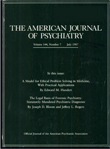Two-Year Outcome of Psychotic Depression in Late Life
Abstract
OBJECTIVE: The purpose of this study was to determine whether elderly patients with psychotic depression differed in long-term outcome from patients with nonpsychotic depression. METHOD: The study group consisted of 19 patients with psychotic major depression who had responded to ECT (N=15), nortriptyline and perphenazine (N=2), or nortriptyline, perphenazine, and adjunctive lithium (N=2) and 68 nonpsychotic depressed patients who had responded to either nortriptyline alone (N=61) or nortriptyline and lithium (N=7). All patients were maintained on regimens of full-dose nortriptyline. When prescribed for the index episode, adjunctive lithium was also maintained, but perphenazine was withdrawn 16 weeks after response. Patients were followed on a monthly basis for 2 years or until relapse or recurrence, whichever occurred first. RESULTS: Patients with psychotic depression had a substantially higher frequency of relapse or recurrence of depression and a shorter time to these events than nonpsychotic depressed patients. At index assessment, patients with psychosis were more severely depressed and had had more prior episodes of depression, but these factors did not account for the difference in outcome between the two groups. Furthermore, before entering the study, none of the psychotic patients had received adequate treatment for the index episode of depression, and so their poor outcome could not be attributed to prior treatment resistance. CONCLUSIONS: Even when they achieved remission and were maintained on a regimen of full-dose antidepressant medication, older patients with psychotic depression were at greater risk of relapse or recurrence than were their nonpsychotic counterparts. In particular, continuation/maintenance treatment with tricyclic monotherapy following response to ECT had limited efficacy in this group of patients. These findings raise important questions about the optimal treatment of psychotic depression in late life. (Am J Psychiatry 1998; 155:178–183)



